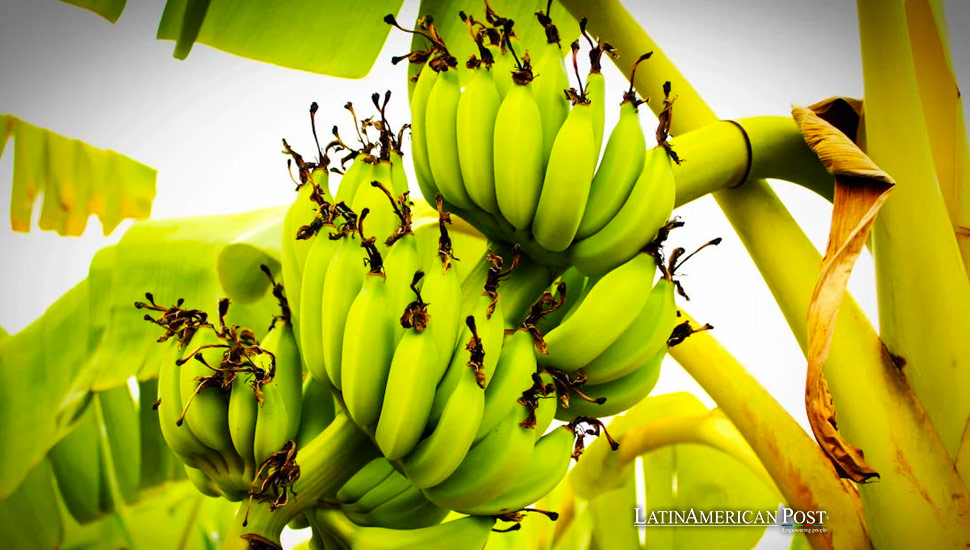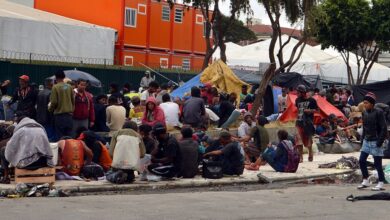Drug Trade and the Banana Business in Latin America

Sniffer dogs in Ecuador recently discovered 6.23 tonnes of cocaine hidden in a banana shipment destined for Germany. This incident highlights the increasing infiltration of the drug trade into the banana business, a significant concern for Latin America.
It was a routine inspection at Posorja deepwater port near Guayaquil, Ecuador. But what the police, aided by sniffer dogs, found was anything but routine. Hidden beneath crates of bananas, ready for export, was a staggering 6.23 tonnes of cocaine. The dogs’ keen senses had detected the presence of drugs, leading to the seizure of 5,630 parcels filled with a white substance that tested positive for cocaine. The shipment, bound for Germany, would have had an estimated street value of $224 million (£173 million).
The cocaine was hidden beneath crates of bananas, which were ready for export. Five individuals were arrested following the discovery, including a representative of the export company who was present during the inspection. This representative provided the names of four other suspects, including managers of the banana plantation where the cocaine was suspected to have been added to the shipment and the driver who transported the container to the port.
The Alarming Rise of Ecuador’s Role in the Drug Trade
Ecuador, a country increasingly becoming a significant transit point for cocaine produced in neighboring Peru and Colombia, is at the heart of the issue. Transnational criminal gangs have been exploiting Ecuador’s ports to ship drugs to Europe and the United States. In 2023, Ecuadorian security forces seized over 200 tonnes of drugs, primarily cocaine, making it one of the top three countries in the world for drug seizures, following only the United States and Colombia.
Despite these efforts, the infiltration of the drug trade into legitimate businesses such as banana exports is a growing concern. The banana industry is one of Ecuador’s most important export sectors, and its corruption by drug traffickers threatens not only the economy but also the country’s reputation on the global stage.
Violence and Crime Linked to Drug Trafficking
The infiltration of the drug trade into Ecuador’s banana business is not an isolated issue but part of a broader problem of violence and crime linked to drug trafficking. Gangs involved in the drug trade have caused a wave of violent crime in Ecuador, prompting President Daniel Noboa to declare a state of emergency. Thousands of police officers and soldiers have been deployed to combat these criminal organizations.
Despite these measures, extortion, kidnappings, and murders remain rampant in the country. In January, officers discovered 22 tonnes of cocaine buried in a pig farm, marking the most considerable cocaine stash ever seized in Ecuador. These incidents underscore the pervasive nature of drug trafficking and its far-reaching impacts on society.
Ecuador’s struggle with drug trafficking and its infiltration into legitimate businesses reflects a broader regional issue affecting much of Latin America. Countries like Colombia and Peru, major cocaine producers, have long battled with the influence of drug cartels. The smuggling routes often pass through Central America and Mexico, further entangling multiple nations in the region in the drug trade.
Addressing the Root Causes
The discovery of cocaine in Ecuador’s banana shipments is a stark reminder of the need for a comprehensive approach to combat drug trafficking. While law enforcement efforts are crucial, addressing the root causes of the drug trade, such as poverty, lack of economic opportunities, and weak governance, is equally important. Strengthening international cooperation and intelligence sharing can also play a vital role in disrupting trafficking networks.
Also read: Mexico’s Fentanyl Seizures Drop Amid Internal Cartel Conflict and Methamphetamine Focus
For Ecuador and other Latin American countries, the battle against drug trafficking is far from over. The infiltration of the drug trade into legitimate businesses like banana exports is a stark reminder of the challenges ahead. By addressing the symptoms and underlying causes of this issue, there is hope for a more secure and prosperous future for the region.





